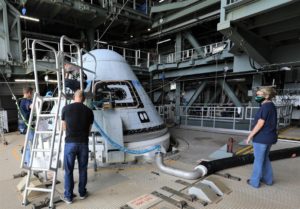Florida's humidity may have nobbled Starliner
16 August, 2021
2 min read
By joining our newsletter, you agree to our Privacy Policy


Boeing engineers suspect Florida's humid weather may have played a part in disrupting the August 3 launch of the company’s beleaguered Starliner spacecraft.
The Starliner headed back to the factory after the company announced on August 13 that the capsule would be “destacked” from the Atlas V rocket that was supposed to launch it into space from Cape Canaveral on August 3.
It will remain at the Commercial Crew and Cargo Processing facility for “deeper level troubleshooting” after around-the-clock attempts to fix 13 stuck oxidizer valves failed to get four working before time ran out.
READ: Screwdriver tip left in engine causes rejected takeoff 100 flights later.
A new launch date will be determined once a problem with the valves is fixed but the Starliner is now back in the queue with other priority missions.
“Mission success in human spaceflight depends on thousands of factors coming together at the right time,” said Boeing Commercial Crew program manager John Vollmer.
“We’ll continue to work the issue from the Starliner factory and have decided to stand down for this launch window to make way for other national priority missions.”
Vollmer told CBS news that engineers suspected water vapor associated with a thunderstorm the day before the launch had somehow made its way into cavities in the oxidizer valves and reacted with a fuel oxidizer, nitrogen tetroxide, to create acid.
Nitrogen tetroxide combines with a fuel called monomethylhydrazine to power the spacecraft’s thrusters.
"The most probable cause of what we're looking at is that we're seeing some permeation of the oxidizer through some of the seals in the valve itself," Vollmer said.
"There was some moisture on the dry side of the valve, and that interaction, we believe, created some nitric acid. That nitric acid resulted in some corrosion which resulted in the stiction (friction which prevents surfaces from moving) of those valves."
The August 3 launch, intended as a test run for a crewed flight, had already been delayed after a problem with a Russian module affected the stability of the space station.
Boeing is competing with Elon Musk’s SpaceX to deliver crews to the international space station but has suffered a series of setbacks, including problems during the December 2019 maiden launch that left it unable to dock with the ISS.
Next Article
2 min read
Asiana Airlines crash - what is next?
Get the latest news and updates straight to your inbox
No spam, no hassle, no fuss, just airline news direct to you.
By joining our newsletter, you agree to our Privacy Policy
Find us on social media
Comments
No comments yet, be the first to write one.
